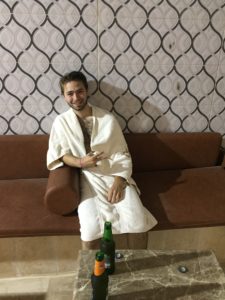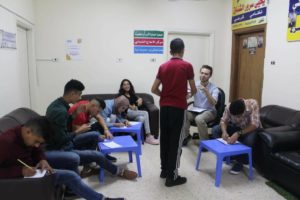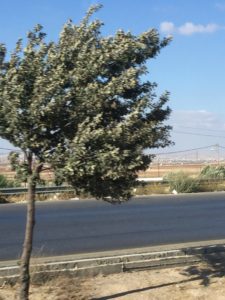This week was a long one. I had three very distinct “cultural experiences”. Two were very enjoyable ones, and one not so enjoyable one.
We’ll start with the unenjoyable one, since it happened first. If you read last week’s content, you probably know about my recent travels to Egypt. One thing that Egypt is famed for is horrendous kitchen cleanliness. While we did our best to only eat at clean, reputable restaurants, something – probably mangoes – got the best of many of us. I got pretty sick while watching the World Cup Final, and after I found out that some people had been diagnosed with parasites, I realized I had to get myself checked out.
I promptly headed to the Specialty Hospital (مستشفى التخصصي) nearby my apartment to get checked out. They prompted me into the ER, and after a brief evaluation took me into a room with about 10 little nooks to receive care. The hospital was clean and the doctors all spoke English (although it took a little extra explaining to make sure I wasn’t given Penicillin as I am allergic). The nurses put me on an IV (not really sure why but oh well), although their English was pretty much nonexistent. I had to ask little things like “kul shay kwais?” (everything is fine?) to make sure I knew what was going on. After my test for parasites came back negative (hamd’illeh) the doctor went Jordanian on me and gave me five prescriptions (the doctors here are infamous for giving too much medicine). Thankfully, a week after my trip I am finishing up my final antibiotic and I think I am all better (inshah allah)!
After a long week of catching up, hospital visits, and midterm exams, my friends and I sought to relax a bit. We figured there was only one way to destress like a Jordanian: by hitting up a Turkish bath (حمامات تركية). Turkish baths are originally from Turkey (obviously) and spread throughout the Ottoman Empire. Today, you can still find many in operation around the Arab world – particularly in Jordan. Although several of the dozen or so baths in Amman serve as tourist spas and charge fairly high prices, my friends and I needed to go cheap, so we went to one located on the outskirts of the city.
When we arrived, we entered a changing room with lockers to place our clothes and changed into basically a disposable bathing suit. We then entered a big, circus like room filled with men (and only men at a traditional establishment like the one we went to) wearing the same disposable bathing suit at different stations of the bathing process. We were directed to begin by showering, and then to enter the hot tub. While sitting in the hot tub, we were brought a sort of sweet cleansing juice/tea. After sitting for about ten minutes enjoying the warm water, we were directed to a man who covered our face in a cream, who then pointed us to the steam room. We spent only five minutes sweating in the steam room (we’re wimps, I know), allowing the pore cleansing cream to enter.
After another shower, we were instructed to lay down on a marble table. A man with an exfoliating loofa-like glove proceeded to rub down every inch of your body, removing a plethora of dead skin. After shower number three, we went to be scrubbed down – quite literally a man using a scrubbing device with soap to clean you. It felt a little like being a six year old taking getting a bath from your mother, but it also felt pampering. After being washed down, we each received a deep tissue message – something I needed after the stress of midterm studying! Rising up from the table after one last shower, I felt pretty incredible and cleaner than ever. After being dried off and handed two towels, I was able to bask in my new found cleanliness. We were stunned at the low price of 10 JD for the entire treatment. While I would not recommend a Turkish Bath for the faint of heart (there’s a lot of men, and women are generally not allowed unless there’s a separate room), for those up for an interesting time it is a great way to chill out with some friends and get a wonderful little spa treatment.

My final cultural experience led me to a group that has quickly become a significant minority in Jordan: Syrians. Historically, Syria was the most powerful and peaceful nation in the Shams; but in 2011, that changed with the attempts to oust President Bashar al-Assad and the outbreak of the Syrian Civil War. It is estimated that since the start of the Syrian civil war, roughly 1.2 million Syrians have fled to Jordan, with Jordan housing more refugees than any other country except for Lebanon and Turkey.
As you walk around Amman, you can sense that Jordan’s northern neighbor has had its cultural impact on the city. For instance, you can regularly find booza(بوظة) – a Syrian-style ice cream enriched with gum to be more malleable and less prone to melting. The best way to eat it is covered in pistachios. At a recent trip to Bakdesh – a Syrian transplant ice cream parlor that has become Amman’s preferred place for booza – I saw the staff member quite literally roll a cylindrical thing of ice cream in pistachios. The treat is not very sweet because of the nuts and is a excellent way to finish a meal.
A number of people in the city have Syrian roots. We met a shopkeeper from Syria who mentioned he learned English back in school (Syria’s were the best in the region). Adding a bit of comedy, his coworker jarred in, “Yeah Bashar al-Assad taught him English, you believe it?” This little interaction seems to sum up Syrians in Jordan: they live normal lives like most Jordanians and acknowledge the many downfalls of their country; yet they are proud of their heritage and truly yearn to return to their homes up north.
While you can certainly find traces of Syria in Amman, I wanted to really explore the conflict. So when the opportunity to teach English to a group of refugees in Irbid came up, I jumped on the opportunity.
Irbid is Jordan’s second largest city, yet it feels a world away from Amman. Nestled in the forested mountains up north, the streets are tree-lined and the town feels more like bustling suburb that anything. Irbid sits twelve miles away from the Syrian border and roughly twenty miles away from Daraa – the birthplace of the revolt. As a result, many of the Syrians who relocated to Jordan chose Irbid – a Syrian-esque city close to the border.

After arriving with my group of volunteers, we were handed a group of forty refugees. Some spoke English well enough to understand NPR podcasts; others couldn’t even read the alphabet. Our challenge was to group them so they could get something out of our short English lesson. I was in charge of a group of “intermediate” speakers who ranged drastically in quality. I spoke predominantly in Arabic – something I was surprised I was able to do – in order to teach things about writing and grammar. After having them write mini stories, I helped them edit their writing, and I am sure that learned at least the word “to keep”! The experience was incredibly fruitful for the kids and even helped me improve my Arabic.
While teaching, we asked everyone to say their names and where they were from. Most of the group identified as from Irbid. However, one student said he was from Homs in Syria. After the lesson while we were feasting on a meal of mansef, I asked him a little about his life. He had been living in Jordan for seven years, and he very much seemed at home. However, when I asked him which he preferred, he gave a big smile and responded, “Syria, of course!”
Jordan has plenty of experience with refugees in the past, as hundreds of Palestinians have been absorbed into Jordanian society. Because of the welcoming nature of Jordan, Syrians are treated well; but they very much miss their home and would return if they had the chance.

On the bus back from Irbid, you can see the Syria very clearly. As I took in the scenic view, I thought about how beautiful a country it must be, and how wonderful its people are. It truly is sad to see how war can tear apart such a lovely place, especially given the comfort and safe feel of Irbid. I hope in the future that Syria can regain its glory and welcome visitors – and its own people – back into the land.